Dr. Catalin Brylla, Principal Lecturer in Film and TV has chaired the DEI Committee for the Society for Cognitive Studies of the Moving Image since 2022, launching several initiatives. At this year’s conference at the University of Alberta in Canada he organised three related events:
DEI Roundtable and Workshop: Intersectionality, Bias and Positionality
This roundtable featured international scholars, including Charles Kebaya (Machakos University, Kenya), to explore how intersectionality, bias, and positionality shape our work in film and media research. The session was followed by two facilitated workshop groups: one focusing on teaching (including decolonising curricula and participatory learning methods), the other on research (including de-centralising publishing, engaging with Global South scholarship, and community-led research methods).
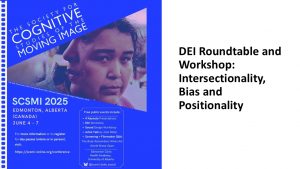
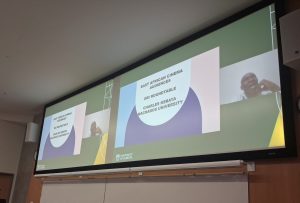
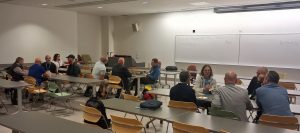
The workshops offered a space for critical reflection and practical strategies for fostering equity and inclusion in teaching and research, addressing the following questions.
- How do we approach research and teaching when we acknowledge the researcher’s and teacher’s partial perspective shaped by their intersected social identities?
- When the positionality of the researcher differs from that of the research participant, research collaborator, screen character or film viewer, how does this frame our analytic lens and the choice of research methods?
- What happens when we study marginalised groups without their collaborative participation? Do we risk replicating epistemic hierarchies or social practices that have contributed to this marginalisation? (relates to slogan “Nothing about us, without us.” – disability rights movement)
- In cross-cultural and cross-ability research and teaching, how do we account for not only difference, but for blind spots in acknowledging and respecting different positionalities?
- How can we design curricula that properly balance between dominant and underrepresented academic and non-academic knowledge structures?
Mentorship Lunch: Learning from Academic Trial and Errors
This event provided an informal and supportive space where senior scholars shared candid reflections on the mistakes, challenges, and lessons that have shaped their academic journeys. We rarely speak openly about trial-and-error experiences in teaching, research, or media practice. Even more rarely do we celebrate these moments or fully recognise the valuable contributions they make to eventual positive outcomes. As a result, when we engage with the work of other scholars—whether through conversation, presentations, or publications—their research is often presented as a neatly packaged narrative of clear and successful results, with little acknowledgement of the mistakes, missteps, and failures that inevitably occurred along the way.
The session covered topics from research and publishing to teaching, grant-writing, and career development, this session invites open discussion with early career researchers about navigating the ups and downs of academic life.
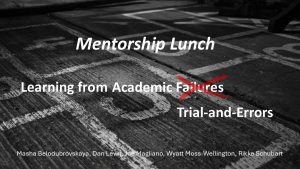
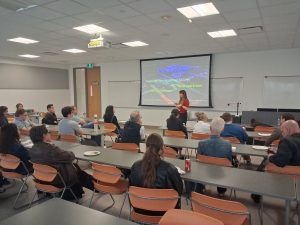
Paper Presentation on Social Cognition, Bias and Audience Perception of Films
Together with Dr. Tico Romao (University of Alberta), Brylla proposed a framework for audience segmentation that focuses on the mapping of intersecting social identities across viewers and screen characters. This type of spectator segmentation offers a more granular alternative to explain divergent viewer responses and biases. This can reveal the often-overlooked gap between authorial intent and spectatorial reception. This framework is especially useful in comparing responses to structured and formalist narratives, as well as more open or ambiguous narrative forms.
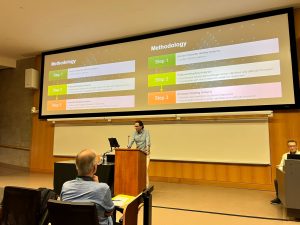
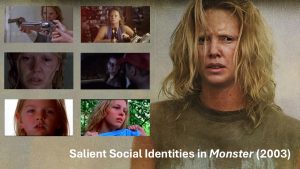
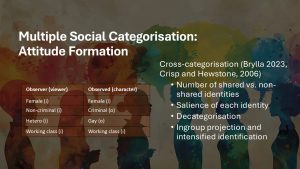
 Royal Society of Chemistry Inclusion & Diversity Fund – Application Deadline: Monday 25 April 2022
Royal Society of Chemistry Inclusion & Diversity Fund – Application Deadline: Monday 25 April 2022 BA Blindness and Media Engagement Project led by Dr. Catalin Brylla
BA Blindness and Media Engagement Project led by Dr. Catalin Brylla










 New CMWH paper on maternity care
New CMWH paper on maternity care From Sustainable Research to Sustainable Research Lives: Reflections from the SPROUT Network Event
From Sustainable Research to Sustainable Research Lives: Reflections from the SPROUT Network Event REF Code of Practice consultation is open!
REF Code of Practice consultation is open! ECR Funding Open Call: Research Culture & Community Grant – Apply now
ECR Funding Open Call: Research Culture & Community Grant – Apply now ECR Funding Open Call: Research Culture & Community Grant – Application Deadline Friday 12 December
ECR Funding Open Call: Research Culture & Community Grant – Application Deadline Friday 12 December MSCA Postdoctoral Fellowships 2025 Call
MSCA Postdoctoral Fellowships 2025 Call ERC Advanced Grant 2025 Webinar
ERC Advanced Grant 2025 Webinar Update on UKRO services
Update on UKRO services European research project exploring use of ‘virtual twins’ to better manage metabolic associated fatty liver disease
European research project exploring use of ‘virtual twins’ to better manage metabolic associated fatty liver disease